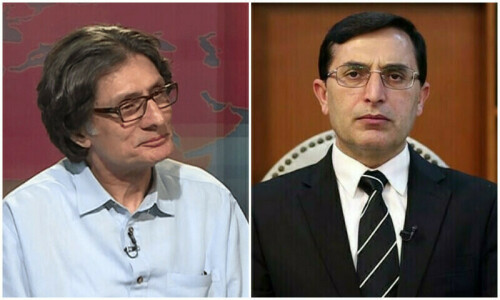THE first reaction to the return home of Zeenat Shahzadi on Thursday after two years is of course one of relief.
The young Lahore-based journalist was abducted by armed men on Aug 19, 2015, while on her way to work. At the time, she had been pursuing the case of an Indian national, Hamid Ansari, who had gone missing in 2012 after being arrested for crossing illegally into Pakistan from Afghanistan.
After getting in touch with his family in Mumbai, Ms Shahzadi had filed a habeas corpus petition in the Peshawar High Court as well as applications with the Supreme Court’s Human Rights Cell and the Commission of Inquiry on Enforced Disappearances.
It was rather ironic — although not unprecedented in Pakistan — that she herself soon became a ‘missing’ person. According to CoIoED, Ms Shahzadi was recovered from the Pak-Afghan border and that “anti-state elements and anti-Pakistan secret agencies” had been involved in her disappearance.
However, following relief over her safe recovery, there should be a groundswell of anger. Anger that apparently the most that the public and the authorities — specifically the courts and CoIoED — can now hope for is that the missing return unharmed.
Disregarding all protests of civil society, the theatre of enforced disappearances has not only expanded from Balochistan to the rest of the country, especially Sindh, but it has also become more brazen, with abductions taking place even in broad daylight in urban centres. Journalists, rights activists, social workers — anyone it seems is a viable target. Several still remain missing.
There is no doubt that Pakistan, like most other countries, must remain vigilant against subversive elements, but the state, in complete violation of constitutionally protected rights, has evidently expanded the definition of ‘subversion’ to include any citizen critical of its policies or seeking for it to be held accountable. The circumstances of Ms Shahzadi’s disappearance and ‘recovery’, the threats she had received prior to her abduction and the fact there was no ransom demand during her captivity, raise questions that lend themselves to but one conclusion.
Meanwhile, the CoIoED, set up six years ago by the government as a “landmark achievement” has proven a toothless and ineffectual body with neither the resources, inclination nor power to do more than document cases of enforced disappearances.
In not a single instance has it held the perpetrators to account.
Last but not least, Ms Shahzadi’s case has also highlighted the suffering of the families of the missing in a particularly tragic way. Her brother, unable to cope with her continued absence, committed suicide last year.
That is a loss she can never be compensated for. Moreover, a journalist like this young woman, committed to actually seeking out the truth rather than acting as a passive observer, would be an asset in a civilised society. But then, Pakistan would have had to be a different country.
Published in Dawn, October 22nd, 2017









































